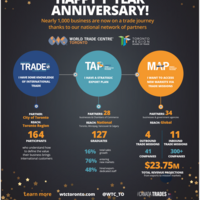

News
Celebrating One Year at WTC Toronto

By Leigh Smout, Executive Director, World Trade Centre Toronto
With the Canada-European Union Comprehensive Economic and Trade Agreement (CETA) entered into force, the Comprehensive and Progressive Agreement for Trans-Pacific Partnership (CPTPP) signed and a new deal negotiated between Canada, the U.S. and Mexico, Canadian small and medium-sized enterprises (SMEs) are at the center of a global trade network positioning them for growth. But all of our trade agreements are just so much paper, until companies sell into those markets.
For too long, Canadian SMEs have avoided leveraging their country’s trade agreements, with only 4 percent exporting compared to an average of 20 percent among G7 peers. If Canada increased its share of SMEs exporting to the same level as its large firms—23 percent—it would result in an estimated $225 billion in new export activity and create 2 million new jobs.
That is where World Trade Centre Toronto (WTC-T), the trade-enabling services arm of the Toronto Region Board of Trade, comes in. We are aggressively laying a foundation for Canada’s SMEs to seize growth beyond their own borders. WTC-T officially launched on September 20, 2017, and a year later, we’ve cultivated a national network of more than 60 partners creating global export opportunities for nearly 1,000 Canadian businesses across its suite of offerings.
Our roadmap to expansion began in November 2015, when senior executives from eight Toronto region businesses became the inaugural cohort of the Trade Accelerator Program (TAP-GTA)—a dynamic, hands-on workshop helping SMEs scale up, develop and execute an export plan. Since that first exciting session, TAP has been greatly enhanced and has now trained more than 300 Toronto companies, like Premise LED, a manufacturer of energy-efficient lighting products, who saw a 300 percent increase in sales and grew its staff by 30 percent after completing the program.
Recognizing TAP’s effective delivery on the commitment to helping businesses reach new high-growth markets, WTC-T established partnerships with Royal Bank of Canada and Export Development Canada to support the program’s cross-country expansion. TAP is now offered in Winnipeg, Vancouver, Calgary, Edmonton and Montreal, with similarly exciting results and there are more Canadian cities in the pipeline.
The Board’s Priority Export Markets report, released during WTC-T’s 2017 launch, has provided WTC-T with the tools to advise SMEs from the Toronto region’s established and emerging sectors to strategically select the most opportune high-growth markets. In partnership with the City of Toronto, we led exclusive inbound missions where businesses gained access to wider e-commerce opportunities with JD.com and Alibaba Group, and customized outbound trade missions spanning three continents. The results: revenue forecasts of at least $23.75 million from exports to mission markets.
Going forward, WTC-T will continue to leverage its expanding network to equip SMEs with the resources they need to export and boost growth and job creation that is so vital to Canada’s economic prosperity. If WTC-T, its partners and participating SMEs were able to achieve this much growth in one year, imagine what we can achieve in the years ahead as Canadian business embraces going global.
For more details on World Trade Centre Toronto programs and services, visit wtctoronto.com.